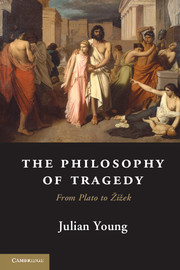Book contents
16 - Conclusions
Published online by Cambridge University Press: 05 June 2013
Summary
Two questions, we have seen, have provided the focus of philosophical investigations of tragedy: What is tragedy? Why, in spite of its distressing aspect, do we value tragedy? It is now time to articulate certain conclusions with respect to these questions which, in the course of the preceding pages, seem to me to have manifested themselves.
The first question calls for a descriptive answer. It asks what it is that distinguishes tragedy from other literary genres. Given the masks of the two dramatic muses, the laughing mask of Thalia and the weeping mask of Melpomene, it asks what it is that the mask of Melpomene symbolises. The answer, I think, is rather straightforward and simple and is told to us by the mask itself: tragedy is a very sad story. That is, with respect to the content of tragedy, Schopenhauer is surely right: ‘the presentation of a great misfortune is alone essential to tragedy’ (WR I, p. 254). And with respect to the effect of tragedy Aristotle is surely right: the story needs to be told in such a manner as to generate (among other emotions) fear and pity and their catharsis.
- Type
- Chapter
- Information
- The Philosophy of TragedyFrom Plato to Žižek, pp. 263 - 270Publisher: Cambridge University PressPrint publication year: 2013

